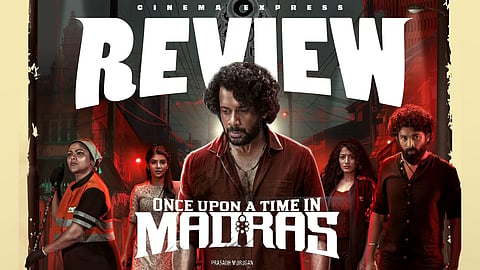

What would you do if you believe injustice has been meted out to you and are handed a gun? Would you pull the trigger against those responsible? Prasadh Murugan’s hyperlink thriller, Once Upon a Time in Madras, asserts that emotionally charged characters often do, especially when fate provides them with the means. The film weaves together the lives of Bharath’s Raja, Abhirami’s Savitri, Anjali Nair’s Madhi, and Thalaivasal Vijay’s unnamed character, who all find themselves ensnared in conflicts. A gun that lands in their hands by chance becomes the catalyst for their choices. Murugan ambitiously tackles weighty issues like transphobia, marital rape, homophobia, and caste prejudices. While the filmmaker ultimately connects the dots at the end, Once Upon a Time in Madras feels like a loaded chamber with no real firepower. The film misfires due to shoddy editing and poor execution, leaving its potentially impactful themes undermined.
Raja is forced to take up a hit job to save his dying wife. Savitri must protect her trans daughter Karthi from a predatory loan shark. Madhi, newly married, begins suspecting that her husband is having an affair. Thalaivasal Vijay plays a man consumed by caste pride, vehemently opposing his daughter’s intercaste love marriage. How these four stories collide, all tied together by a single gun, forms the crux of Once Upon a Time in Madras.
Director: Prasadh Murugan
Cast: Bharath, Abhirami, Anjali Nair, Thalaivasal Vijay, Shaan, Pavithra Lakshmi
The film has a loaded premise but ends with an empty magazine. By incorporating true crime elements and featuring queer and transgender representation, the film ambitiously aims to shoot for the stars. However, it misses the mark due to its execution, resulting in a story with too much recoil and not enough precision. The screenplay, while ambitious, jumps back and forth between the four storylines with abrupt cuts that contribute to a chaotic viewing experience. Logic takes a backseat in several places, further stalling the film. For instance, Bharath’s wife, an educated woman from a well-off family, inexplicably falls in love with a hitman with no stable income. Similarly, Savitri’s decision to leave her trans daughter alone at home, despite receiving rape threats from a loan shark, feels implausible and forced. These narrative blanks might seem minor in isolation, but together, they chip away at the film's potential.
The film also grapples with issues in its core messaging. While attempting to shed light on the evils of the caste system, it places the burden of this message on a character whose sudden leftist ideology feels forced. His dialogue, “Thappu panravana adikardhu dhaan right nu nenachen, aana ippo left dhaan right nu nenaikiren,” lacks subtelty and comes off more preachy than profound. The film’s handling of poetic justice also feels inconsistent. While one rapist is shot and injured in the genitals—an act of poetic irony that lands well—another is simply shot dead, leaving us questioning the uneven sense of morality at play. Similarly, while one character is shown to be trained with a gun, another shoots with ease at point-blank range, and a third person struggles with the weapon until she finds her grip. However, it remains unclear where the fourth character learnt to handle and shoot with precision, raising questions about plausibility. Even more unbelievable is the fact that all the characters, regardless of their backgrounds or beliefs, so readily choose to wield a gun and take justice into their own hands. This blanket approach to justice feels too convenient, diluting the emotional weight of their decisions. The film’s aim to make its characters' actions feel justified ultimately misfires, leaving its audience unconvinced and its message riddled with inconsistencies.
Alongside the filmmaker’s attempt to spotlight overlooked day-to-day crimes, Once Upon a Time in Madras hits the bullseye with the performances of its lead actors. Bharath is compelling as a desperate husband willing to go to any lengths to save his ailing wife. Abhirami is subtle as a sanitation worker who is still learning to come to terms with being the mother of a transwoman while supporting her by all means. Anjali Nair stands out as the quintessential housewife who gradually finds her footing in a patriarchal household. These stellar performances act as the film’s safety catch, preventing it from entirely ricocheting off its own ambition.
Once Upon a Time in Madras is a film that loads its chamber with potent themes and sharp performances but ultimately fires off a mixed bag of blanks and bullets. While its ambition is commendable, the chaotic execution and inconsistent logic cause the story to stumble before it truly takes aim.